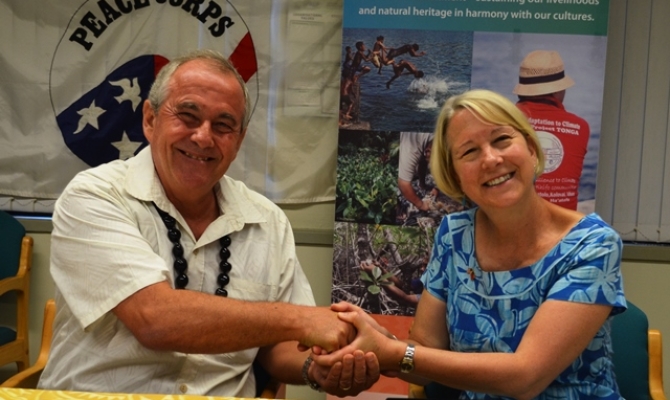
Climate Change Resilience
Peace Corps Director Ms. Carrie Hessler-Radelet joined Director General of the Secretariat of the Pacific Regional Environmental Program (SPREP), David Sheppard, to sign a Memorandum of Understanding between the two organisations that will strengthen the region's response to climate change by placing Peace Corps Volunteers within SPREP.
The Pacific islands are amongst the most vulnerable to the impacts of climate change, across the region with the environment and income sources of the Pacific islands negatively impacted by rising sea levels, extreme rainfall and cyclones.

SPREP works to protect the environment and promote sustainable development across the Pacific region, and the new agreement will place Peace Corps Response volunteers at SPREP to help improve adaptation and resilience to climate change impacts in Pacific Island countries and territories.
"This exciting partnership with the Peace Corp signals new possibilities as we grow with the experiences, technical advice and input that will be provided through these volunteer assignments at SPREP. We look forward to this contribution towards Pacific islands resilience as we work with our island members who are on the frontlines of climate change impacts," said Mr. David Sheppard, Director General of SPREP.
Volunteer assignments will range from six to 12 months and focus on biodiversity and ecosystem management, climate change, waste management and pollution control, and environmental monitoring and governance. Peace Corps Response is made up of returned Peace Corps Volunteers who have successfully completed two years of service or highly qualified professionals tasked for short term assignments around the world.
"Under President Obama's leadership, the United States is committed to supporting Climate-Resilient International Development, and at the Peace Corps, we are prepared to do our part," Hessler-Radelet said at the signing ceremony. "Together we will seek viable solutions; together we will build communities more resilient to the devastating impact of climate change.”
The Pacific islands are amongst the most vulnerable to the impacts of climate change, across the region with the environment and income sources of the Pacific islands negatively impacted by rising sea levels, extreme rainfall and cyclones.

L - R, Mr David Sheppard with Ms. Carrie Hessler-Radelet
SPREP works to protect the environment and promote sustainable development across the Pacific region, and the new agreement will place Peace Corps Response volunteers at SPREP to help improve adaptation and resilience to climate change impacts in Pacific Island countries and territories.
"This exciting partnership with the Peace Corp signals new possibilities as we grow with the experiences, technical advice and input that will be provided through these volunteer assignments at SPREP. We look forward to this contribution towards Pacific islands resilience as we work with our island members who are on the frontlines of climate change impacts," said Mr. David Sheppard, Director General of SPREP.
Volunteer assignments will range from six to 12 months and focus on biodiversity and ecosystem management, climate change, waste management and pollution control, and environmental monitoring and governance. Peace Corps Response is made up of returned Peace Corps Volunteers who have successfully completed two years of service or highly qualified professionals tasked for short term assignments around the world.
"Under President Obama's leadership, the United States is committed to supporting Climate-Resilient International Development, and at the Peace Corps, we are prepared to do our part," Hessler-Radelet said at the signing ceremony. "Together we will seek viable solutions; together we will build communities more resilient to the devastating impact of climate change.”